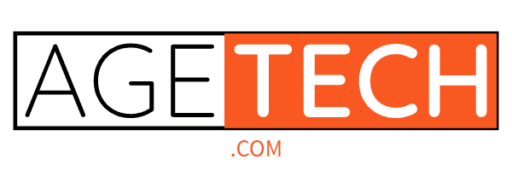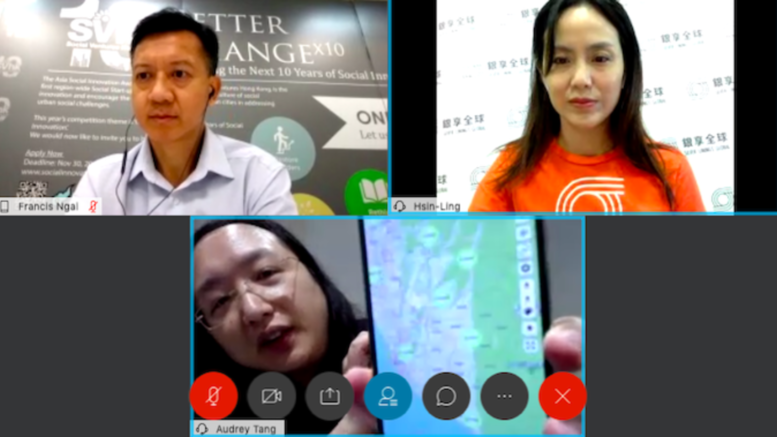

Today, Taiwan Aging2.0 Ambassador and CEO of Silver Linings Global Hsin-Ling Tsai hosted Taiwan’s Digital Minister Audrey Tang (read about her remarkable accomplishments here) together with Aging2.0 Co-founder Stephen Johnston and Francis Ngai, Founder of Social Ventures Hong Kong to discuss ‘Longevity in a Post-Pandemic World’. The above screenshot shows Minister Tang demo-ing one of the open source apps they’ve developed to show availability of masks across the country.
You can watch the livestream replay HERE.
Here are my key takeaways from our wide-ranging conversation:
Pandemic silver linings. Despite the tragic human and economist costs, some silver linings were identified, including: an increased awareness of the need for population health, rise in interest (and experience by younger people) in loneliness and the adoption of tech for vulnerable population.
Tech take-up among older adults. Adelaide’s Global Center for Modern Ageing recently conducted some research on the uptake of technology among older people during the pandemic, and found that 23% of Australians aged 60+ had used new technology since the pandemic began (eg. iPads, smartphone apps or video calls). Encouragingly over one in five (22%) had had an online doctor appointment, but interesting only 19% had used online shopping, which seems like a clear opportunity to improve.
Social ventures in Hong Kong. Francis Ngai shared three innovative social programs they’re working on in Hong Kong that are helping to ‘build back better’:
- Emerging resilient economies. This is about making a more inclusive economy to survive and thrive in uncertainty. Part of the effort includes a ‘co-working factory’ and support of local manufacturing. Sustainability is a big theme; one project in particular, Green Monday, has helped vegetarianism in Hong Kong go from 5% to 30%, and other programs support synthetic food.
- Purpose leadership. This is about getting businesses and family officers to ‘lean in’ as partners with governments and civil society to deliver more effective systems change. For example, they created a community resilience fund in three weeks, working Swire Properties and Bupa among others.
- New city coalitions. The ambition here is to have the whole city – not just healthcare providers – to get engaged in health and wellness. It includes recognition of leading innovators with the Asia Social Innovation Award. Note: there are some overlaps here with the new Places Impact Report by Swire Properties, also focused on Hong Kong.
Taiwan’s world-class response is built on trust, collaboration and openness. Minister Tang made the point that governments should trust their citizens more, and in turn citizens will trust their governments. Part of that is transparent cause and effect – for example, being able to instantly see the changes in number of available masks in stock on the mobile app, as you get your weekly allocation of masks with your insurance card. Or the case of the story of the boy who didn’t want to go to school because they only had pink masks and he was worried about ‘looking like a sissy’; his parents called the 1922 toll free number to let them know, and that day all the government leaders at the ministerial briefing were wearing pink masks as a show of support.
Another innovation in Taiwan’s are ‘participation officers‘; these are media managers whose job it is to ‘speak’ to hashtags on social media. Their remit is to respond to trending hashtags relevant to the government (or with misinformation) within 2 hours, and reframe them towards the truth. Their mantra is “humour over rumour” and they apparently focus on making fun of themselves and the government. This kind of rapid, self aware, tech-forward and witty government language is unique in my experience.
Most of the new technologies are based on open standards, with an army of coders and ‘hackers for good’ working on developing new services in days or weeks. A final takeaway from the session – Taiwan is open and ready to help, and this site they’ve built is one way to do that, for example sharing open source blue prints for factories and redistributing excess masks: www.taiwancanhelp.us.
About the Author
Stephen Johnston MBA is a co-founder of Aging2.0 a global innovation platform for aging and senior care, founder of Fordcastle, an innovation consultancy and a member of the Future Agenda, the world’s largest open foresight initiative. Stephen serves on the board of Music and Memory a New York 501c3 nonprofit focused on improving the quality of life for older people, He is co-author of Growth Champions (Wiley, 2012), a book about sustainable corporate growth. He has an MA in Economics from Cambridge University and an MBA from Harvard Business School where he was a Fulbright Scholar.

